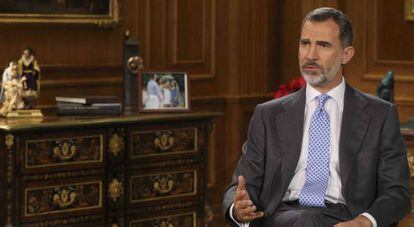King Felipe VI calls on new Catalan government to respect plural society
But pro-independence forces remain unconvinced by monarch’s call for calm in Christmas message

Just three days after a snap election in Catalonia that has left the region more polarized than ever over the independence issue, Spain’s King Felipe VI on Saturday used his traditional Christmas speech to call on the new government in the region to “tackle the problems that affect all Catalans, respecting plurality and thinking responsibly about the common good.”
After warning that the decision to again go down the unilateral independence route taken by political leaders in Catalonia in recent years could “lead again to confrontation and exclusion,” the monarch called for “serenity, stability and “mutual respect” to be restored in the region.
Eduard Pujol with Junts per Catalunya said King Felipe had shown himself once again to be “the 155 monarch”
The king’s Christmas message had been his most highly anticipated yet and was recorded after the results of the Catalan election became known. In that election – called by Madrid in response to the passing of a unilateral declaration of independence in the region in later October – 47.5% of votes went to the three pro-independence parties fielding candidates. Critically, the bloc won enough seats to form a majority in the regional parliament.
At the same time, the strongly anti-independence Ciudadanos party had a bittersweet victory by becoming the largest single party in the region, picking up the most seats and winning the greatest number of votes.
Even the ousted premier of Catalonia, Carles Puigdemont, had addressed the issue of the king’s Christmas message, calling on King Felipe to “correct” an October 3 speech when the the monarch spoke out against the disloyalty of the Catalan government, and endorsed the application of emergency powers using article 155 of the Spanish Constitution.
The king did not correct his earlier speech but his tone was notably more moderate. While he did not step back from his demand for the Catalan government to respect for “the principles and values of the state of law” he extolled the importance of dialogue as fundamental for coexistence and highlighted “the inalienable will for harmony” among the people of Spain.
King Felipe said the new Catalan parliament must “face the problems that affect all Catalans”
Right from the beginning of his Christmas message, King Felipe recognized 2017 had been “a difficult year” because of the Catalan crisis. But the monarch who came to throne in 2014 after his father abdicated, also used the speech to highlight the success of 40 years of Spanish democracy – a period which had seen Spain become “one of the most advanced countries in the world.”
In a bid to combat the propaganda of the independence movement of recent months which has seen Catalan leaders resuscitating the ghost of the repressive Spain of the former dictator Francisco Franco to damage the image of the country overseas, King Felipe spoke of “an open and caring Spain which is not inward looking.” He spoke of a country that “recognizes and respects” plurality and diversity” and which has “a spirit of integration.”
And while admitting that not every move made had been correct and that “there will still difficult and complex situations,” the king said the balance of the last 40 years had been positive. “We have to appreciate and value this. We deserve this as a country,” he said.
After underling the fact that Spain is “a mature democracy where all ideas can be defended,” the king broached the Catalan crisis, stating that “respecting and preserving the values” of the rule of law was absolutely essential to guarantee the constitutional principles of liberty, equality and justice because “when they give way, coexistence deteriorates and then later it becomes unviable.”
King Felipe said the new Catalan parliament must “face the problems that affect all Catalans” and said “the road cannot lead again to confrontation or exclusion as – as we already know – this only generates discord, uncertainty, dejection and moral, civic and – of course – economic impoverishment,” he said, referring to the exodus of businesses from the region.
He called on political parties in Catalonia to work to restore “stability, serenity and mutual respect” in “a diverse and plural” Catalan society so that ideas do not “create distance between, or separate families and friends.”
The king also said he hoped for a rebirth of the confidence and prestige of Catalonia with its “capacity for leadership and hard work, its creative spirit, its desire for engagement, and its sense of responsibility.”
Lukewarm response
On Monday, however, independence parties were unanimous in their criticism of the king’s speech saying there had been “no basic change” in the position of Felipe since his October 3 message.
Eduard Pujol with Junts per Catalunya, the party of Carles Puigdemont, said King Felipe had shown himself once again to be “the 155 monarch.” Meanwhile, the pro-independence speaker of the Catalan parliament Carme Forcadell, said that while she respected “the opinion of the head of state,” she hoped the “opinions of those Catalans who had voted on December 21” would be respected as well.
King Felipe recognized 2017 had been “a difficult year” because of the Catalan crisis
Other independence politicians including Alfred Bosch with the Catalan Republican Left (ERC) demanded the “release of political prisoners,” a reference to the four politicians and political activists who are currently in pre-trial detention and facing charges of rebellion and sedition for their role in their recent independent push in Catalonia.
“He is the King of Spain and it is the king who has to renounce unilateralism, the use of batons and the sending of people to prison for political reasons,” said Bosch of the king’s Christmas message.
English version by George Mills.










































